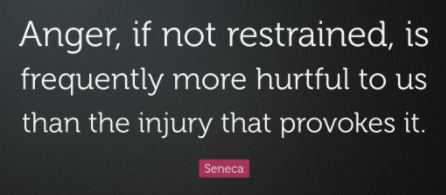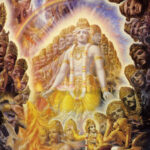Book 1
1 – Anger is a type of madness. Look at an angry person and see how they have lost their mind.
2 – Anger has caused great harm to mankind. Ruined cities, wars, etc.
3 – Anger is unique to humans, animals do not possess true anger. It’s a desire to repay suffering. It’s the foe of reason.
4 – There are many forms of Anger. Irascibility is a general proneness to anger.
5 – Anger contradicts all of man’s benevolent qualities such as gentleness, affection and mutual assistance and is therefore not in accordance with nature.
6 – Sometimes punishment is necessary. But the purpose of punishment is to correct or heal someone’s behaviour, not to harm them. Anger seeks only to harm so it is not necessary for punishment.
7 – You shouldn’t attempt to harness anger. Reason is only strong when separate from the passions. Once anger grows it will overpower reason and you will be a slave to it.
8 – “The best plan is to reject straightway the first incentives to anger.”
9 – If reason is stronger than anger then you don’t need anger, if reason is weaker than anger then it will be overpowered by it. So either anger is useless or uncontrollable.
10 – If anger is more powerful than reason, the only way to control it is to set against it a more powerful vice such as fear. Wherefore reason is in the position of flying for aid to vices!
11 – Anger does not benefit you in war. You want your attacks to be thought out and orderly, anger is prone to rashness.
12 – You can choose to protect or avenge someone out of duty, you don’t need anger to do so. It is also more honourable since you’re doing it from deliberate judgement and not from impulse. The fact that on occasion anger may have done good does not make it a good, any more than a shipwreck benefiting someone makes shipwrecks good.
13 – Good qualities become better the stronger they are. Take anger to its extreme and it’s obviously not a good quality. Anger does not assist courage but takes its place, you’ll note it’s often the weak who are the angriest.
14 – Good men should not hate bad men or acts. It is error that leads to bad acts, it makes no sense to hate error. Further you’d end up hating yourself in that case since you also err.
15 – Hating a man because he errs is like hating a sick man because he is ill. When you punish someone, it should be for their good, not to satisfy your desires.
16 – Anger should play no part in punishment. Punishment should be reasoned and impartial.
17 – Anger is not a weapon because it cannot be put down at will.
18 – Anger is a terrible judge. It is inconsistent, hasty and can invent crimes where none exist.
19 – Irascibility avoids truth because remaining angry feels good. Reason is the better judge. “no wise man punishes anyone because he has sinned, but that he may sin no more”.
20 – Anger affects those of weak minds.
21 – There is therefore nothing great or noble in anger.
Amazon #ads

Book 2
1 – Anger is not above the control of reason.
2 – Some motions like shivering are beyond our control. But anger can be put to flight by wise maxims; for it is a voluntary defect of the mind.
3 – Passions begin with impulses. We cannot avoid the impulse, but we can prevent them becoming fully-fledged passions. It is a conscious choice to allow it to develop or not.
4 – Impulses and emotions differ. Emotions are brought into existence by deliberate mental acts.
5 – Anger if too readily indulged it can eventually develop into a permanent character trait of cruelty.
6 – Joy at good actions is glorious, anger at bad actions is base. The Wise man will become irascible if always angered by bad deeds.
7 – If you’re angry at evil deeds your mood will depend upon others, you will also never cease to be angry since there’s so much evil in the world.
8 – The mob is fraught with vices.
9 – If you want to be as angry as men’s crimes require, you will not be angry but go mad with rage.
10 – People committing sin is to be expected, it’s foolish to be angry at things you expect. Be not an enemy to but an improver of sinners.
11 – Anger is not to be praised for inducing fear. Fear affects feeble minds and there is nothing great in it.
12 – It is possible to overcome anger. The mind can carry out whatever orders it gives itself.
13 – There’s no need for us to defend anger. Get rid of it. The wise man does his work without the help of any evil passion, especially one which needs to be watched so closely.
14 – It is acceptable to feign anger, but not to be angry. Great athletes avoid anger because it clouds judgment.
15 – Cultures prone to anger are less successful.
16 – We revere wild animals, but they are not to be imitated. Humans possess reason which is superior, and if you imitate anything, imitate God. 17 – Don’t be angry but don’t be feeble either. Do be prepared to use force when necessary but not out of anger.
18 – Two categories of remedies for anger: Preventing it from arising and avoiding doing wrong when it does arise.
19 – Different people have different natural dispositions to anger.
20 – Those who are predisposed to anger should deliberately avoid arousing it. Those of calmer dispositions should take care to avoid opposite vices such as cowardice, despair and suspiciousness. It’s possible for anger to become a learned habit of the mind.
21 – Overindulging or flattering children can lead them to develop angry characters. Raise them in a down to earth manner. It’s a fine balance, subdue their anger, but avoid crushing their spirit. They should focus on conquering their antagonists but not on hurting them. They must earn things by merit and never by begging.
22 – To resist anger, focus on its first cause: the belief that we are injured. Allow time to elapse before forming your opinion.
23 – Choosing not to feel injured and forgiving wrongs often leads to better outcomes for all.
24 – Avoid suspicion and mistrust. Focus on being straightforward and having kindly interpretations of other people’s actions.
25 – Luxury leads to irritation at petty things. Toughen up, choose to live a less luxurious life.
26 – Inanimate objects, animals and children are ignorant of any wrong they do us. As are foolish men who have little more sense than children. It’s daft to feel anger towards any of them.
27 – The universe does not revolve around you; natural events are nothing to be angry at. Punishments received from good men are usually intended for our benefit not harm.
28 – No one is faultless. When others sin, remind yourself of the sins you yourself have committed.
29 – “The greatest remedy for anger is delay”.
30 – You can always find a reason to forgive someone.
31 – Anger arises from a sense of injury or of unjust treatment.
32 – It is usually more honourable, and better for all, to ignore transgressions than to avenge them.
33 – If you do seek revenge, do so only as a remedy, not out of anger.
34 – Meeting other people’s anger with kindness can extinguish the anger. Forgiveness generally yields better results than aggression, as violent acts merely escalate over time.
35 – Anger damages itself in its lust for revenge.
36 – Anger can lead men to ruin and to destroy their own lives. “men have thrust swords through the bodies of those whom they loved, and have slain those in whose arms they have lain”.
Amazon #ads

Book 3
1 – Treatment depends on the degree of anger and on the personality of the individual.
2 – Anger affects all peoples and not just individuals but sometimes entire nations.
3 – Despite all its terrible faults, many still believe anger to be a virtue.
4 – Anger dominates one’s mind and removes one’s freedom; a man in the grip of anger acts like an animal.
5 – To help avoid becoming angry, remind yourself frequently of its vices. How far more glorious it is to be impervious to insults than to revenge them.
6 – “There is no greater proof of magnanimity than that nothing which befalls you should be able to move you to anger.” Avoid scattering your attention on many projects or taking on things beyond your ability, doing so leads to anger.
7 – Be neither petty nor yet reckless in your projects. Before beginning, estimate your power and the power needed to complete it. Failure moves the hot-blooded to anger, the cold-blooded to sorrow.
8 – Associate with good-tempered people, we copy our habits from those around us. Avoid or check disputes before they become rooted and grow.
9 – Cut out things that aggravate you, like law courts and politics. You can adjust your life such that you are less exposed to anger.
10 – We don’t all take offence in the same way. Determine what your weak point is and guard against it.
11 – Don’t go looking for things to take offence at. It is possible to turn offences into something to be laughed at.
12 – Many deliberately make themselves angry in choosing to take offence at trifles. Consider deeply the other person’s perspective and delay your judgement.
13 – Our inward thoughts become influenced by our outward behaviour. Control anger if you can, hide its effects if you cannot.
14 – It’s entirely possible to restrain anger, as people do so when in extreme fear.
15 – Even the anger which arises from unheard of outrages can be concealed. Occasionally it is necessary to control anger in this way.
16 – Anger results in misery, it is better to endure hardships that to give in to anger.
17 – Anger leads one to inhuman acts.
18 – Anger becomes addictive.
19 – Anger can ruin and tear apart whole nations.
20 – Anger can lead one to act without thought.
21 – Some even become angry with inanimate objects.
22 – Expect people to criticise you and learn to accept it when it happens. (More on handling criticism here)
23 – Just because you’re powerful it doesn’t mean you need to be angry when someone less powerful criticises you.
24 – Everyone gives offence at some time and there’s usually a good reason to excuse them, look for it.
25 – Everyone makes mistakes. Ponder your own mistakes before becoming angry at others. Becoming angry generally does you more harm than the thing you’re angry at.
26 – People making mistakes generally don’t know they are making them, they believe they are in the right.
27 – It’s better to heal an injury than avenge it. You will cease to be angry at some point, so why not chose to cease now?
28 – It is better to focus on good than on harm. We frequently cause ourselves harm through anger.
29 – People frequently become angry wrongly then choose to stay so rather than admit fault.
30 – Observe how trifling are the matters that provoke anger.
31 – Whoever you envy, there are people who envy you. Be grateful for what you have not angry at what you don’t.
32 – Let different qualities in different people keep us from quarrelling with them: fear, shame or disdain can all be useful to prevent anger.
33 – Goods are not good if they disrupt your tranquillity.
34 – It is the setting of great value on trifles and then competition over them that causes anger. Basically putting high priority on petty things.
35 – Don’t be pretentious or set yourself apart from other people, we are all human, you are nothing special.
36 – Toughen your spirit. Ask yourself how you have improved yourself each day.
37 – Expect troubles. When encountering rudeness, observe how petty it is and smile to yourself.
38 – Respond to insults with humour.
39 – Do not attack another’s anger head-on. Console them and delay their actions. Aim to let their anger subside somewhat before tackling it.
40 – Don’t reprove a man who is still angry.
41 – On rare occasions, if someone’s anger is aiming towards inhuman acts, you can use fear to prevent them taking action.
42 – Your time is limited, don’t waste it being angry.
43 – Death faces us all and is the bigger concern. Don’t trouble yourself with the petty acts of others, focus your time on doing good not evil.




